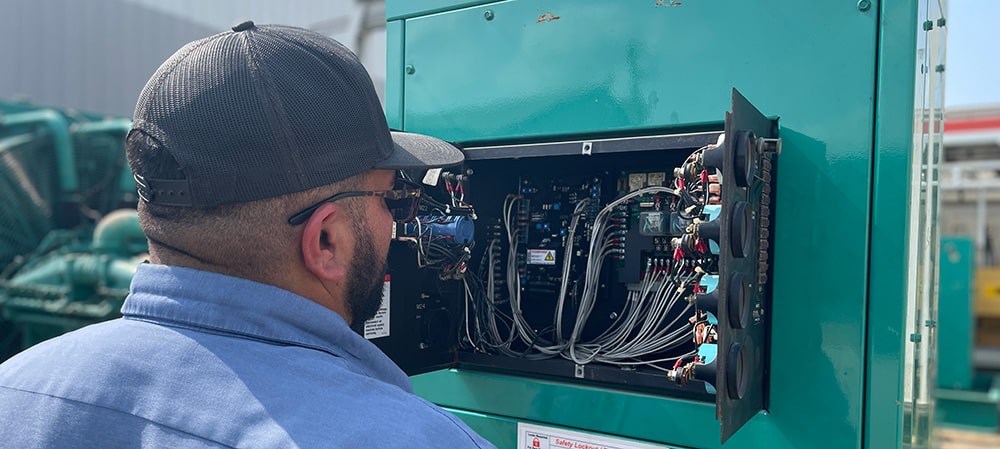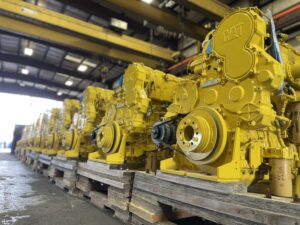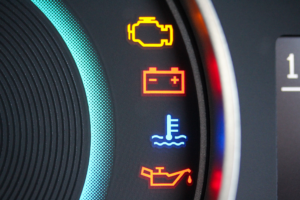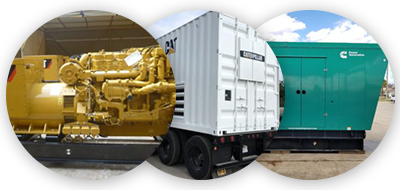
Purchasing an engine for industrial applications is no easy feat — it’s a major purchase with significant impacts for your business, and the process involves numerous technical details that can be difficult to pin down.
But that doesn’t mean that buying an industrial engine needs to be a headache every time. In this guide, we’ll cover the main things you need to know before purchasing your next industrial engine. From an overview of the most reputable brands to a breakdown of different engine types, this guide will help prepare you to make an informed decision when looking for your next industrial engine.
Want an even more in-depth explanation of industrial engines? Download our free Ultimate Industrial Engine Buyer’s Guide for detailed step-by-step guidance through the purchasing process.
Finding the Right Industrial Engine
Depending on the application, the type of engine you’re looking for will vary widely. Different types of industrial engines have distinct specifications for power output, efficiency, fuel availability, and environmental depending on the way they will be used in the field.
From construction and agriculture to manufacturing and transportation, industrial engines power a diverse range of machinery and equipment that keep industries moving forward. Some of the trades that utilize industrial engines include:
- Construction
- Agriculture
- Manufacturing
- Transportation
- Power Generation
- Marine
Understanding the differences between the types of industrial engines used in each of these industries is paramount to finding the right engine for your needs. A marine engine, for instance, will need specific traits such as resistance to corrosion and certain types of cooling systems.
To determine the type of engine you need, the two main factors that any buyer should consider are size and fuel type.
Size will determine the power output of your engine. To calculate the power requirements for your engine, examine the equipment that the engine will be powering and evaluate the power needed to run. You can also utilize a power calculator or consult an expert who can help you determine the power required for your purposes. Choose an engine that can produce the necessary amount of power without underpowering or overpowering your machinery.
Fuel type is the other main factor to consider, since it will affect your operating costs and environmental impact. Diesel engines are largely popular for heavy-duty use, but other fuel types such as gasoline, natural gas and electricity may have specific advantages depending on the situation. When evaluating the pros and cons of different fuel types, make sure to consider availability, cost and the impact on the environment.
Buying New vs. Used
Buying a new engine versus a used engine is another key consideration in the buying process. The most obvious difference is cost: used engines are typically much more affordable compared to newer engines, saving your business a significant amount of money.
The other factor to consider is that used industrial engines tend to have a more proven track record, and therefore will be easier to evaluate based on their performance history. Always inquire about the usage history of an engine to assess its reliability and to determine if it’s the right engine for your needs.
Used engines are also typically more customizable, meaning they can be modified to fit different power outputs or sizes in order to fit to your exact specifications, as opposed to new engines which often arrive as-is. They’ll also often be more readily available, so you can skip the wait for a new unit and find your perfect engine right away.
If you choose to buy a used engine, ask for any maintenance records that can help indicate the reliability of your unit and any recurring problems. The engine’s usage history might also help you determine if it’s the right fit for your needs, especially if it was used for similar purposes in the past.
When buying used, make sure to find a dealer that has a tried-and-true process for testing and quality assurance. Because there are so many different factors to consider when purchasing an industrial engine, finding a reputable vendor can streamline the process, especially when they’ve proven to be a reliable source of quality machines.
Top Industrial Engine Brands
Finding an industrial engine from a reputable brand is one way to help ensure you’re buying a quality piece of equipment. These brands have a proven history of producing reliable engines for various uses. Depending on the application of your engine, you might want to consider looking for engines from the following companies:
Cummins
- Known for durability
- Wide range of industries, including marine
Caterpillar
- Known for construction and industrial applications
- Diesel, natural gas and marine engines
Kohler
- Long history of engine manufacturing
- Diesel, gas and marine models
MTU
- Global leader in power generation equipment
- Diesel engine systems and marine propulsion
Volvo Penta
- Specialize in marine and industrial applications
- Wide range of diesel, gasoline and hybrid engines
Find Your Next Industrial Engine
At Depco, we help companies power their world with confidence, using our trusted method that guarantees quality power systems. If you need help navigating the buying process for an industrial engine, don’t hesitate to reach out to one of our experts who can help walk you through it. For more information on buying used engines, take a look at our Ultimate Buyer’s Guide to Used Engines.






